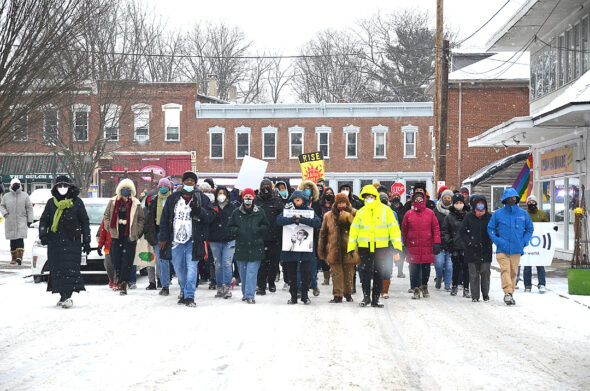
The annual Martin Luther King Jr. Day march was held Monday, Jan. 17; more than 100 marchers traveled south from the municipal lot at Xenia Avenue and Corry Street and north on Walnut Street before ending back at its starting point. The march was followed by the annual MLK Day program, held virtually for the second year in a row. The program included music, readings and addresses, and culminated in the presentation of the Community Peacemaker Award, this year given posthumously to Karen McKee, who died in December. (Photo by Matt Minde)
Karen McKee honored at Martin Luther King Day event
- Published: January 26, 2022
Over a blanket of snow, more than 100 villagers marched through downtown Yellow Springs in the annual Martin Luther King Jr. Day march on Monday, Jan. 17. After walking and singing in below-freezing temperatures, marchers returned to the warmth of their own homes to view the annual program, held again this year via Zoom.
The theme of this year’s program was “Do Something! From the Sidelines to the Frontlines.” In a press release, the Martin Luther King Jr. Day Planning Committee stated that it had chosen the theme because the “various racial equity rallies of 2020 have yet to lead to systemic changes, but instead have generated backlash,” and that the theme’s intention was to communicate the need for further action “on the frontlines within various institutions.”
With respect to that theme, the march began with a call to action from emcee Bomani Moyenda, who asked participants to demand action from national leaders on stalled voting rights legislation.
“We are in a stark battle for our voting rights,” Moyenda told those assembled on Corry Street before the march began. At the top of the program that followed the march, Moyenda reminded those watching that Martin Luther King Jr.’s “life stood for much more than his iconic ‘I Have a Dream’ speech — he was, in fact, more importantly … a strategist and an organizer.”
Moyenda then read contact information for Democratic Sens. Joe Manchin and Kyrsten Sinema, both of whom have stalled efforts concerning the proposed Voting Rights Act, and urged participants to take the information down.
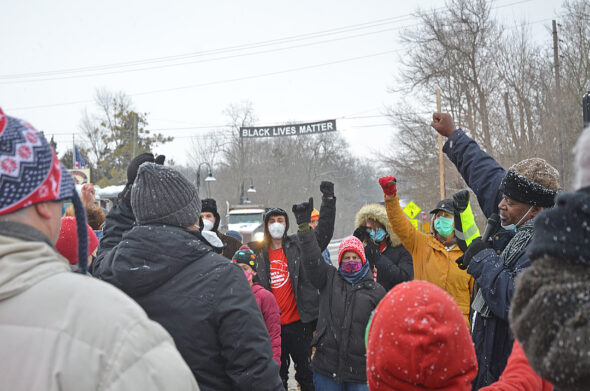
(Photo by Matt Minde)
“Let’s get busy and call these people and apply pressure,” Moyenda said. “I, for one, do not want to live in a society where our votes are being suppressed.”
The call to “get busy” was echoed in an address from Shadia Alvarez, who is officer of diversity, equity and inclusion at Antioch College and executive director of the Coretta Scott King Center, which had also hosted a virtual program of social justice readings prior to the march. Considering the theme of this year’s program, Alvarez reflected on the divisions that persist in society — including “the frontlines, the sidelines and who’s in the back of the line” — and the ways those divisions are perpetuated by the “cloak of formality and institutional policy.”
She also offered guidance for those who aim to move into the frontlines, asking them to consider that “leadership development is not about position, my friends — it’s about practice.”
She added: “Being on the frontlines demands that we always ask questions when making any decisions: ‘Who does this benefit? Who does this impact? Does this bring us closer together, make us stronger? Does it uplift those most vulnerable? And if it does, show me the evidence. And if it does not, how do we fix it?’”
Musical performances by percussionist Gyamfi Gyamerah and the World House Choir were included in the program, as well as readings by village youth. Eight-year-old Kyla Randolph read Langston Hughes’ poem “I Dream a World,” and 11th-grader Vincent Baker read from Martin Luther King Jr.’s famed “I’ve Been to the Mountaintop” address, which was given on April 3, 1968 — the day before King was assassinated.
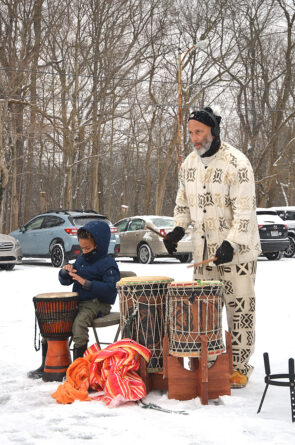
(Photo by Matt Minde)
The program also included addresses from Juliet Fromholt of WYSO and Suzanne Patterson of the YS Senior Center, as well as essays read by the winners of the YS schools’ annual Peacemaker essay contest. This year’s winners were Sasikala Drees, Merida Kuder-Wexler, Cory Martin, Gini Meekin, Lydia Palm, Sylvia Peirson, Lucy Shows-Fife and Corinne Totty; these works will be published in the YS News in future issues.
The apex of the event was the presentation of the annual Community Peacemaker Award, presented posthumously this year to Karen McKee, who died in December after living with cancer for a year. The award was presented by Linda Cox, chair of the annual event’s planning committee. Cox cited McKee’s work with the Senior Center, St. Paul Catholic Church, The 365 Project, The Next Steps Initiative and the James A. McKee Association — founded by and named for McKee’s father — as emblematic of her dedication to community service in the village and beyond.
“We believe that she not only epitomized the spirit of this award, but also that her legacy will endure for years to come,” Cox said.
The award was accepted on McKee’s behalf by her sister Bari McKee Teamor.
“Karen never asked for or accepted accolades for the contributions she made, whether they were to her family, her friends, her church or her community,” Teamor said.
She added that McKee was told that she would be the 2022 Community Peacemaker Award prior to her death. Teamor shared that she had asked McKee for information about her history of community service for the program while McKee was in the hospital.
“And in her vernacular, she said, ‘Bari, it ain’t that deep,’” Teamor said.
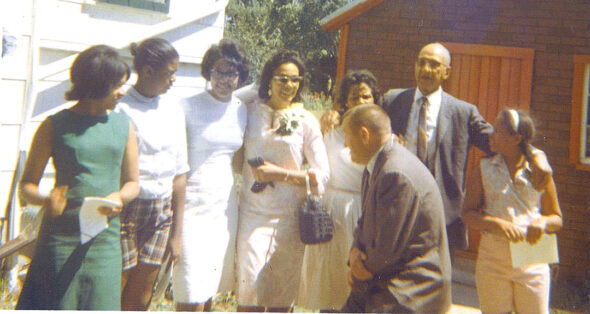
Bari McKee, Jean McKee, Karen McKee, Coretta Scott King, Naomi McKee (obscured by Sheriff Russell Bradley), Elmer Lawson and Sandy McKee. (Submitted photo)
A foundation of family, service
According to McKee’s sisters — Teamor, Jean McKee and Sandra McKee Smith — her dedication to serving her community was deep, and a critical part of who she was.
“Her motto was, ‘What can I do?’” Teamor told the News in a recent interview with the three siblings. “That was just Karen.”
Speaking via Zoom, the McKee sisters reminisced about growing up with Karen McKee, who was the second of five children, including their brother, the late Jimmy McKee, who died in 2012. They noted that the family’s connection to the village spans 160 years — their forebears were part of the Conway Colony, a group of formerly enslaved Black Americans who were brought to freedom in Yellow Springs in 1862 by a member of the Conway family, who had enslaved them. Jean McKee said those deep familial roots were the foundation of the siblings’ village life, and that they loved growing up surrounded by “our great-grandmother and our grandparents and our cousins.”
“Everybody was family,” she said.
Their connection to the village was strengthened by the example of community service that was modeled by their elders: their mother, Naomi McKee, had been a member of the local group The Victorettes, which performed and organized events for villagers and corresponded with locals stationed overseas during WWII. Through her work with Vernay Labs, Naomi McKee was also recognized by Eleanor Roosevelt for contributing to the war effort. Their father, James McKee, served as Yellow Springs’ chief of police for 34 years, and later founded the civic organization The YS Men’s Group, which was renamed The James A. McKee Association after his death in 2003.
Their parents’ positions as community leaders also brought the siblings into the orbits of a couple of legendary national leaders — namely, Coretta Scott King and Martin Luther King Jr. Naomi McKee had been friends with Scott King when she was a student at Antioch College, and the McKee siblings met the Kings when they came to the village in 1965.
“When Dr. King was asked to be the commencement speaker at Antioch, they ended up staying at the house right across the street from us on Limestone,” Teamor said.
With those auspicious influences willing her forward, Karen McKee took up the mantle of service as soon as she entered her professional career. After graduating from Central State University, she relocated to the Washington, D.C., area and worked first as an educator in the public school system and then as a substance abuse counselor.
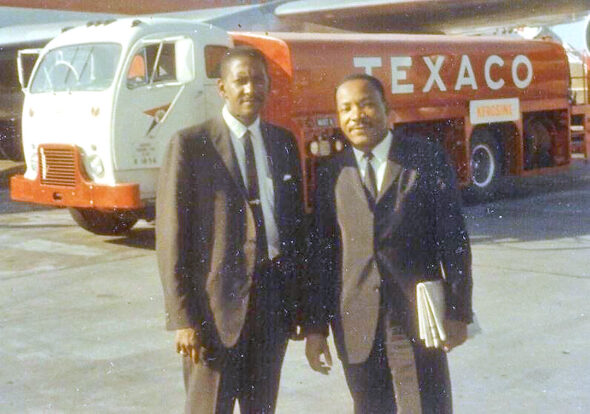
James A. McKee with Martin Luther King Jr. (Submitted photo)
Despite McKee’s distance, the siblings remained connected to one another and to their personal roots; on a trip to Stafford County, Va., to visit the home of Moncure Conway — for whom the Conway Colony was named — Teamor and Jean and Naomi McKee surprised Karen McKee with a visit.
“Karen pulls up, sees me and then stops, sees Mom — she doesn’t park, she just jumps out of the car screaming! And Mom says, ‘Karen, get your car, honey!” Jean McKee said, followed by the laughter of her sisters.
With a lingering chuckle, Teamor added: “She really loved her family.”
After her retirement, McKee returned to the village in 2012 to find that it had changed in the intervening years. McKee had come of age knowing a number of Black community leaders — including her parents — and a thriving district of Black-owned businesses. Teamor said they recognized the uniqueness of growing up in a place that was relatively diverse, at least compared with surrounding towns.
“Those places were distinctly different from Yellow Springs, and we were all proud of that fact,” she said.
In the years between McKee’s departure and return, however, most of the village’s Black-owned businesses had closed, and the percentage of Black villagers was dropping — from around 27% in 1970 to just under 12% by 2020.
Nevertheless, McKee’s sisters said she jumped right into community work with both feet, with the memories of the Yellow Springs of her youth as her clarion call.
“Karen’s commitment to Yellow Springs and the community that she remembered was part of the motivation for her getting involved in so many activities,” Jean McKee said. “She felt that, by being a part of [the village], she could impact it by sharing her experience and her knowledge, versus complaining about how it had changed.”
McKee’s community service touched a number of organizations and initiatives. As part of the Wheeling Gaunt Sculpture Project’s planning committee, she was instrumental in bringing the long-awaited edifice of Yellow Springs’ most celebrated philanthropist to fruition — though her illness precluded her from celebrating its unveiling in 2021. She also helped lead the James A. McKee Association and, according to Teamor, “reinvigorated” the civic group, including helping to expand its election year candidate forums to multiple nights.
McKee was a significant player in two initiatives aiming to shore up and honor Black history in the village: the installation of a plaque honoring the Rev. Wesley Matthews, the founder of the YS Senior Center, and writing and organizing entries for The 365 Project’s “An Encyclopedia of Blacks in Yellow Springs.”
Jean McKee said that, in addition to her ever-flowing supply of energy and dedication, her sister had a talent for bringing others in her life into the projects about which she was passionate.
“Karen was very good at volunteering you,” she said with a laugh. “She was working on the [encyclopedia], and suddenly I was going to the meetings with her. And then, suddenly, I had assignments.”
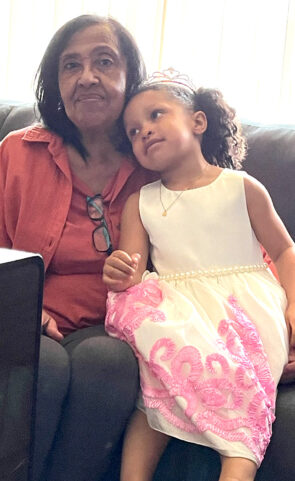
Karen McKee with her great-niece, Parker Jones. (Submitted photo)
Smith and Jean McKee both said they have committed to carrying on with some of their sister’s community work: Smith intends to support the McKee Association, and Jean McKee will continue to work on the encyclopedia.
“Not that I can fill Karen’s shoes,” Smith said. “No one can.”
The sisters remarked that, even as she was nearing her final days, McKee remained focused on supporting her family and her community.
“From her sickbed, she was still talking about the fruit baskets that needed to be organized for the community,” Teamor said. “And when we were all at home for Thanksgiving dinner — which she had always done herself — she orchestrated it from the hospital, calling us to say, ‘Is it out of the oven yet?’”
Smith added that, earlier in her illness, McKee had helped her through a brutal 12-hour back surgery that left Smith unable to care for herself for months.
“Here she is, a cancer patient trying to fight for her life, but she’s taking care of me,” Smith said.
Through laughter — and some tears — McKee’s sisters considered her legacy, and what she hoped her lifetime of work would inspire.
“She would want people to stay involved with the community, and the different organizations that she cared about — especially the younger people,” Teamor said. “She wanted Yellow Springs to be diverse again.”
And they remembered her as a hardworking, fun-loving woman whose energy and devotion knew no bounds.
“She was the life of the party — you never knew what was going to come out of her mouth,” Smith said.
Jean McKee added: “And she had a well of compassion and empathy that was bottomless.”
The Yellow Springs News encourages respectful discussion of this article.
You must login to post a comment.
Don't have a login? Register for a free YSNews.com account.











No comments yet for this article.